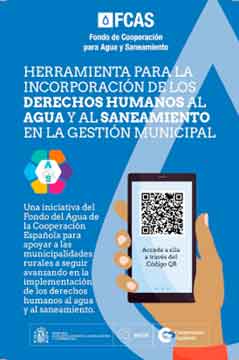Human Rights Approach to Water and Sanitation
Promoting sustainable, participatory and transparent water management, with an emphasis on universal access
Promoting sustainable, participatory and transparent water management, with an emphasis on universal access

Advancing the progressive realization of the Human Rights to Water and Sanitation is one of the guiding principles of the Fund’s interventions. This implies that populations have sufficient, healthy, and acceptable water that is physically accessible, economically affordable, and sanitation services. The Fund’s actions also promote sustainable, participatory, and transparent water management, focusing on universal access and paying particular attention to the most vulnerable and fragile areas and countries.
In 2022, it is worth mentioning the presentation of the Self-diagnosis Tool for the Incorporation of the perspective of the human rights to water and sanitation (HRWSS) in the municipal management of water and sanitation services in Latin America. An initiative aimed at supporting local governments to advance in the progressive incorporation of the Human Rights to Water and Sanitation. The objective is to strengthen their capacity to plan, regulate, and provide such services, favoring participation and social auditing by the beneficiary population.
This is an anonymous access tool that allows users to self-evaluate themselves and establish lines of work in those aspects where they discover the most significant shortcomings.
The tool was presented for the first time at the LATINOSAN Sanitation Conference after a first «Validation» workshop in Bolivia.
In 2022, the Water Fund participated in the World Water Forum held in Dakar in March. There, the FCAS led a session on the Realization of the Human Rights to Water and Sanitation, with the participation of the UN Special Rapporteur on this issue, Pedro Arrojo, the Secretary of State, Pilar Cancela, and representatives of partner countries and civil society.
In addition, as in previous years, work continued to implement the Human Rights to Water and Sanitation in all the Fund’s live portfolio programs through workshops and specific training and awareness-raising activities.
La semana del 21 al 26 de marzo se celebrará en Dakar el Foro Mundial del Agua, un encuentro en el que se dan cita todos los actores del sector del agua y el saneamiento para trabajar y debatir en torno a la situación del recurso hídrico en el mundo. En esta ocasión, lo harán con la vista puesta en la importancia de la seguridad hídrica para garantizar la paz y el desarrollo.
“Por fin podré cantar en la ducha”. Esta fue la frase, inesperada, sorprendente, con la que concluyó su discurso una de las líderes comunales de las parroquias rurales de Portoviejo, en Ecuador, ante una importante delegación de entidades financiadoras que se encontraban visitando el proyecto que llevará agua potable a las comunidades. Una frase, reflejo de la alegría de las pequeñas cosas, que nos recuerda que algo tan cotidiano y aparentemente sencillo como pasar unos minutos bajo la ducha se torna en una realidad imposible para millones de personas en el mundo.
All of the Water Fund’s work is conducted within the framework of the 2030 Agenda and the Sustainable Development Goals (SDGs), especially around SDG 6: «Ensure availability and sustainable management of water and sanitation conditions for all people.» In addition, SDG 6 is positioned as one of the leverage goals to make progress on others, such as Ending poverty (SDG 1), Ensuring healthy lives (SDG 3), Ensuring education (SDG 4), Promoting gender equality (SDG 5); Reducing inequalities (SDG 10) and Achieving sustainable cities and communities (SDG 11), among others, thus playing a clear role as a driver of development.